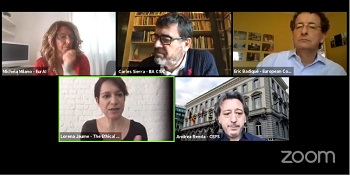
The Delegation of the Government of Catalonia to the EU, together with the Center for Contemporary Studies and the IDEES magazine, launched this morning a virtual debate on European Artificial Intelligence (AI) policies with the participation of renowned experts. Lorena Jaume-Palasí, Eric Badiqué, Michela Milano and Andrea Renda were the panellists of the conversation, that could be followed live on the Youtube channel of the Department of Foreign Affairs.
The panellists analysed the impact and potential of AI and debated on the policies being pursued by the EU to regulate these new technologies. They agreed that in the current pandemic context, AI becomes more important than ever. For this reason, it is key to regulate its use in order to meet the ethical challenges it poses. Thus, they highlighted the need to understand AI from the most humane perspective and to keep in mind that all decisions taken in the regulatory framework have consequences that can change democracies forever.
The representative of the Government of Catalonia to the EU, Meritxell Serret, opened the session by emphasizing the need to develop strategies to regulate AI technologies, which are transforming the world. "Today, we want to build visions at a common level, to contribute to a European AI strategy that puts the EU fundamental values and all the individual and collective rights and principles at the core of the AI".
Pere Almeda, director of the Center for Contemporary Studies and the IDEES magazine, stressed the need to promote an AI strategy and ecosystem that respects democratic values and meets the challenges that arise. "Facing the growing power of China's AI technology related to social control, and also the leading corporations in the United States that innovate with military, as European citizens we are all very concerned to promote AI aimed at the common good, with an ethical background”.
Carles Sierra, moderator of the event and director of the Research Institute on Artificial Intelligence (IIIA) of the Higher Council for Scientific Research (CSIC), emphasised the key role of the education in the use of AI technologies. "The education of children is fundamental to allow the society to have a critical approach to this technology”.
The panellists took into account the current context of the coronavirus crisis during the debate. Lorena Jaume-Palasí, founder and executive director of The Ethical Teach Society, focused on the ethical implications and changes that AI can generate at the society in the long term. "A big part of the democratic architecture that we have today was created in war and epidemic situations. The things we change now will remain and shape the evolution of democracies. We need concerted action from different disciplines".
Michela Milano, vice-president of the EurAI association, defended the EU research tradition on AI and also the results achieved so far in this field. Milano highlighted the limitations of the EU's AI strategy and pointed out some of the keys to improving, such as creating a favorable ecosystem to retain talent, aligning applied research with more basic research, facilitating access to AI for users with less technological training and more funding for high-level research. According to the expert, the Covid-19 pandemic could jeopardize this approach, because the European Commission may be under pressure to prioritise the funding of other fields. "Research in AI is very important in the long term and the EU could use this technology and make a difference by solving sustainable development issues in the framework of the Green Deal".
Professor Andrea Renda, head of global governance, regulation, innovation and digital economy at the European think tank CEPS, said that “the question is not what the EU can do in AI but what can AI do to help the EU to achieve its goals. For example: how can AI help with the SDGs?”. According to Renda, any regulatory framework must be based on an approach that puts people at the center and, in this sense, called the EU to lead an international alliance for an AI that respects this premise. "We need to understand AI technologies as a means and not as an end. One of the mistakes we must avoid is to regulate AI as if we were in the twentieth century, with the approach of past generations. When we start regulating, we have to think about what the world will be like in, at least, five years; decisions must be flexible and adaptive”.
Finally, the European Comission’s AI adviser, Eric Badiqué, emphasized the need to see AI technologies as a way to empower children and adults. "We need AI to be useful to human beings, and this is very clear in the work of the Commission's expert group. We have been leading the discussion on ethics".
The debate ended with a round of questions from the audience, which they sent via the hashtag #EUonAI on Twitter and also via the live chat of the broadcast. Around 250 people attended the session.
